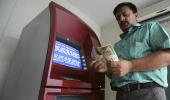 Even as State Bank of India, the country's largest lender, has decided to charge its customers for more than five transactions through automated teller machines (ATMs), private sectors banks continue to be on a wait-and-watch mode.
Even as State Bank of India, the country's largest lender, has decided to charge its customers for more than five transactions through automated teller machines (ATMs), private sectors banks continue to be on a wait-and-watch mode.
However, following SBI's decision, some major public sector banks are re-evaluating the cost of ATM transactions and are likely to take a decision on restricting the number of free transactions.
Among them is public sector lender IDBI Bank. A senior IDBI bank executive said: "As of now, the bank has not changed the terms for ATM usage though RBI (Reserve Bank of India) permitted us. But it has become an expensive proposition, especially when our customer uses other banks' ATMs. An internal assessment is underway for taking a call on revising the terms and charges."
IDBI Bank has 2,727 ATMs at the end of September 2014, he added. A Bank of India official also said they have not revised the charges as of now, but they will review the usage pattern and then take a decision accordingly.
Some public sector bank officials are also inclined to charge consumers for ATM transactions because of the high interchange fee that state-run banks end up paying private sector banks because of the latter's wide ATM network. Interchange fee is the amount a bank has to pay another if its customers make a transaction at the latter's ATM.
However, private sector lenders, especially the mid- and small-sized banks, have decided to play the waiting game and not look at charging their customers any time soon.
"Banks are playing the waiting game now. Even though it has been allowed by the regulator, the lenders are waiting to see who makes the first move in the private banking space. As a result, several banks have decided not to charge as of now," said a bank official from a private sector bank.
According to RBI guidelines, banks are free to charge their customers after the first five free transactions from November 1. RBI had stated that banks could choose to offer more than five free transactions, if they so wished.
The increase in charges by any bank will be applicable to transactions in the six metro cities of Mumbai, New Delhi, Chennai, Kolkata, Bengaluru and Hyderabad. These transactions mean both financial and non-financial balance enquiry, change of PIN, mini statement, etc.
Going ahead, industry players say that even if they levy any charges, it will most likely be free for customers who will maintain a certain average quarterly balance.
"Most banks will not charge HNI (high net worth individual) customers. Moreover, they will ensure the number of free ATM transactions are kept free if you maintain a high average quarterly balance," said another private bank official.
However, the number of free transactions at ATMs of other banks has also been lowered to three.
Earlier, a customer had to pay up to Rs 20 for every transaction beyond five at non-home-bank ATMs. Now, the charges will apply only beyond three transactions at other bank ATMs.
According to RBI data, at the end of June, the number of ATMs in the country stood at 166,894.
Earlier, banks, in association with the National Payments Corporation of India, had sent a proposal to the banking regulator to reduce the number of free transactions at non-home ATMs. They had also sought to be allowed to charge consumers for use of own-bank ATMs.
CHEQUES & BALANCES
- Though SBI has decided to charge customers after the fifth transaction at its ATMs, its pvt sector peers are on a wait-and-watch mode
- Some PSBs are inclined to charge consumers because of the high interchange fee - the amount a bank has to pay to another, if the former's customer makes a transaction at the latter's ATM
- Under RBI guidelines, banks are free to charge their customers after the first five transactions from November 1
- RBI had stated that banks can still choose to offer more than five free transactions, if they so wished
- The number of free transactions at machines of other banks has also been lowered to three
- Earlier, a customer had to pay up to Rs 20 for every transaction beyond five at non-home-bank ATMs. Now the charges will apply beyond three transactions at other bank ATMs












 © 2025
© 2025